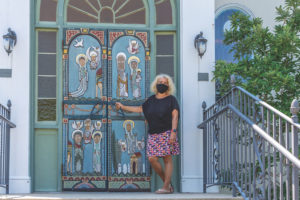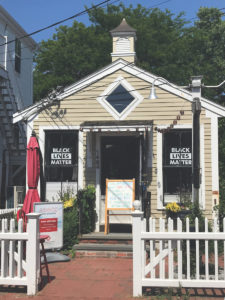Updated Aug. 18, 2020.
When the lockdowns of mid-March first hit, the Cape’s nonprofits were faced with a series of questions. Organizations like the AIDS Support Group of Cape Cod (ASGCC), Wellfleet’s Preservation Hall, and the Cape Cod Children’s Place have had to rethink their services and how they would raise money without traditional summer fundraisers.
“Very early on we made a call to go mostly virtual with our services,” said Dan Gates, CEO of ASGCC. “For people living with HIV, we provide medical case management, and so we shifted to put everything [online], with occasionally some sort of paperwork dropoff.”
HIV testing and Narcan syringe services couldn’t be as easily switched online and required more creative solutions. “If someone wanted Narcan,” Gates said, “they would call our office, we would do a Zoom and give them a tutorial on how to use Narcan, how to identify an overdose, and then how to administer it, and then we would deliver the Narcan with contactless delivery.”
Moving services online had a surprising benefit. “The innovative things we did in syringe services and Narcan were really helpful,” he said, “because it allowed some people to access services who might have felt uncomfortable walking up to the door — but they were comfortable calling.”

In Wellfleet, Preservation Hall has also found ways to work online. “The upside is, virtually, our reach is endless,” said Executive Director Janet Lesniak. “We did a cooking event with Michael Ceraldi, who has a restaurant in town, and we thought we might get 30 or 40 people. We had 140 people participate. I had to up my Zoom account to accommodate them!”
Lesniak described the role of the arts in a time like this, when people are focused on health and human services. “I would say the arts are human services,” she said. “Truthfully, the evidence is in what we’re watching. People are watching films, they’re writing, they’re making art. Arts and culture feed us. We find ways to heal ourselves, and, obviously, we use Western medicine and health centers. But I deeply believe that arts and culture can be preventative of what ails us socially.”
The Cape Cod Children’s Place in Eastham underwent a massive shift in adapting to the pandemic. According to its website, in-person services — the majority of its activities — were suspended. Instead, the CCCP website became a connector for families and other organizations. On its Facebook page, it hosts virtual programs to help parents adjust and promotes programs like the Eldredge Library’s Virtual Storytime.
The ASGCC switched from in-person lunches at its office to delivering the meals in early March.
“Before long, we were delivering over 50 lunches every day,” said Gates. “Some clients were already homebound, but a bunch were people who decided to quarantine because of compromised immune systems.”
There were disappointments, naturally. Preservation Hall’s Youth Film Festival went online, “which really broke my heart,” said Lesniak. “But, again, people from everywhere got an opportunity to see somebody from Nauset High School who made a movie.”
The Hall has a tradition of free outdoor movies in its back yard, an activity made for summer nights. “Right now, we’re thinking we’ll limit it to 30 people,” said Lesniak. “Everybody will be given a pool noodle. You can pick your spot on the lawn, but you have to distance yourself with that.”
More films and some concerts will find their way to the back yard as summer winds down, with recordings uploaded online in the days following.

Outer Cape nonprofits depend on donors along with day-to-day work behind the scenes. Last month the New York Times reported that nonprofits had laid off 70 to 95 percent of their employees, with the offices of organizations like the Y.M.C.A. shutting down. The article painted a dire picture, with a sharply increased demand for services and decreased funding.
Here, nonprofit leaders say the picture is more mixed.
“Many people have been unbelievably generous,” said Lesniak. “I can’t say enough about it. A big concern for us, and most of my nonprofit colleagues, is that as the pandemic continues and people feel less certain of an end in sight, will they have the means to continue to be generous.”
Preservation Hall received funds through the CARES Act to help with payroll.
The ASGCC converted one summer fundraiser into an online race. “We have a 5K event that would’ve been July 19, but we shifted that to virtual,” said Gates. “Its momentum started building as July progressed and people asked to extend it, so we’ve extended it through August 16. They register on our website, pay the $25, and then they run or walk and email us the time.” ASGCC hopes to reach its goal of raising $10,000 from the event.
Nineteen nonprofits participated in the One Provincetown event in late June, in which they showcased their work alongside musical performances and interviews with activists and artists. “A lot of the work is about building community,” said Gates. “It was empowering to see how the community stepped forward with the One Provincetown event. The way the nonprofits came together and supported each other was unexpected. The Provincetown Health Dept. put together a weekly meeting that was vital. Faith organizations, medical organizations, social services agencies were hearing, ‘This food pantry is stocked. This food pantry needs support. This group of volunteers with the Provincetown Task Force is available.’ ”
Provincetown Health Director Morgan Clark set up these meetings because she saw the many ways the pandemic was affecting daily life. “Covid-19 has such a deep and rippling effect on our total well-being, one that we’ll not fully know about for years to come,” said Clark. “So I wanted to gather everyone who serves our community in one place (virtually), so that we could share what we’re seeing with our populations, to troubleshoot gaps as they arose, and to report to policymakers in real time issues that come up.”
Clark said that, while these groups previously communicated and collaborated, the Covid-19 crisis required that that all voices be represented and included.
In Wellfleet, Lesniak has been able to work with groups like Common Table, which provides meals for families and those unable to leave their houses from the Fox & Crow Cafe, partnering with them to be their fiscal agent and alerting Preservation Hall’s friends of Common Table’s need for volunteers.
The most visited page on Preservation Hall’s website is its community resources page, and the Hall’s email list has grown by over a thousand people in four months. “People are looking to us as a connector,” said Lesniak.
Editor’s note: The original version of this article, as printed in the Aug. 13 edition, erroneously reported that Wellfleet Preservation Hall had shared its email list with Common Table. The Hall does not, in fact, share its list with anyone, according to Executive Director Janet Lesniak, but did notify its own contacts of Common Table’s needs.
